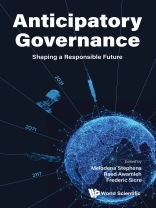Anticipatory Governance is the systemic process of future shaping built on the understanding that the future is not a continuation of the past or present, thus making foresight a complex task requiring the engagement of the whole of government with its constituents in a constructive and iterative manner to achieve collective intelligence. Effective anticipatory governance amplifies the fundamental properties of agile government to build trust, challenge assumptions, and reach consensus. Moreover, anticipatory governance sets the foundation to adapt to exponential change. This seismic shift in the governance environment should lead to urgent rethinking of the ways and means governments and large corporate players formulate strategies, design processes, develop human capital and shape instiutional culture to achieve public value.
From a long-term multigenerational perspective, anticipatory governance is a key component to ensure guardrails for the future. Systems thinking is needed to harness our collective intelligence, by tapping into knowledge trapped within nations, organizations, and people. Many of the wicked problems governments and corporations are grappling with like artificial intelligence applications and ethics, climate change, refugee migration, education for future skills, and health care for all, require a ‘system of systems’, or anticipatory governance.
Yet, no matter how much we invest in foresight and shaping the future, we still need an agile government approach to manage unintended outcomes and people’s expectations. Crisis management which begins with listening to weak signals, sensemaking, intelligence management, reputation enhancement, and public value alignment and delivery, is critical. This book dives into the theory and practice of anticipatory governance and sets the agenda for future research.
Contents:
- Reviews
- Foreword
- Preface
- About the Editors
- About the Contributors
- Anticipatory Governance:
- Anticipatory — The Next Form of Governance (Melodena Stephens, Raed Awamleh, and Frederic Sicre)
- Adjacent Possible Mapping — Exploring the Unknown and VUCA Environment (Kesevan Sampanthar, Noah Frank, and Abhishek Balakrishnan)
- Anticipatory Capacity through Foresight (Mark Esposito and Joshua Park)
- Elevating Anticipatory Analysis in Policymaking (Angela Evans)
- Backcasting: A Design Thinking Approach to Creating Transformative Futures (Melodena Stephens and Sohail Inayatullah)
- Navigating Pathways toward Anticipatory Governance within a Systems Thinking Ecosystem (John Griffiths)
- Leadership and Transformation:
- The AAA Framework: Responsible Leadership for Sustainable Futures (Roger Spitz)
- Unlocking the Power of Public Purpose (Andy Redman, Abhishek Balakrishnan, and Noah Frank)
- Frontier Leadership (Raed Awamleh)
- How a Forgotten Nation Managed Uncertainty — The Restoration of Latvia’s Independence (Rolands Lappuķe and Andrejs Panteļējevs)
- Early Warning Systems: Whispers in the Global Corridors (Melodena Stephens, Frederic Sicre, and Raed Awamleh)
- Governing Advanced Technology:
- Technology, Anticipation and Regulation (Patrick Noack)
- Anticipatory Governance on Cybersecurity (Akshay Joshi, Tal Goldstein, and Giulia Moschetta)
- Envisioning the Future of Government: How Emerging, Secure Technologies and Data Flows Can Enable Anticipation and Action that Improve Performance (Daniel Chenok)
- Digital Transformation: A Tool for Anticipatory Governance (Yousif El-Ghalayini)
- Generative AI and the Copyright Minefield: Creating Safeguards (Sara Al Ghalayini and Kamal Al Awamleh)
- Transformative Change: Future Children (Maddalena Campioni)
- Future of Education and Work: Using Backcasting to Design Guardrails (Melodena Stephens and Sohail Inayatullah)
- Learning from the Past: Guardrails and Opportunities :
- From Old Space to New Space: Not Just an Evolution, Not Yet a Revolution (Donato Giorgi)
- Frameworks for Impact Measurement under Uncertainty (Keertana Subramani)
- Anticipatory Governance and Decision-Making: Prevention of the Entry of Absent Quarantine Pests (AQPs) in Brazil (Estela Alves de Medeiros and Ricardo C Gomes)
- Building an Architectural Framework for Anticipatory Governance: A Case Study of the Asian Development Bank (Susann Roth and Ivana Milojević)
- Humanitarian Logistics and Health Response (Immanuel Azaad Moonesar)
- Synthetic Biology Governance and Advocacy (Melodena Stephens and Abhishek Balakrishnan)
- Index
Readership: Policy advisors, researchers, practitioners and graduate students, in the fields of public administration, public management, public policy, change management, strategic transformation, and governance.
‘Democracy is under attack. Governments are not fulfilling the expectation of their constituents. The only way for governments to become impactful again and validate their roles as builders of the future, is if they embrace anticipatory governance. A government is not an isolated entity, in fact it must embed itself in the business ecosystem, evolving technologies and the international geo-political space. This book of curated chapters is a great starting point to understand skills and practices required for a public sector to embark on that journey. We must review the past, acknowledge the present and move forward shaping a better world for the benefit of all.’ – José María Figueres Olsen President of Costa Rica: 1994–1998
‘It is impossible to overstate the scope and breadth of Anticipatory Governance: Shaping a Responsible Future. The book’s topics and tools, ranging from foresight, to anticipatory analysis, back casting, agility, design thinking, and system thinking, give us means and methods for achieving the goal of the book, ‘shaping the future for the intergenerational inclusive benefit of humanity and the planet’. Each of the authors adds insight and perspective that will be extremely valuable to policymakers and global leaders for generations to come.’ – G Edward De Seve The Coordinator of the Agile Government Center at the National Academy of Public Administration and The Executive Fellow at the IBM Center for the Business of Government
‘Future governments have two choices for future risks — navigate the future reactively or proactively shape the future. If the latter choice is where you wish to go, this book presents a starting point to understand how governments can begin their journey to transform their public sector. To shape the future, you need anticipatory governance, and the skills transformation for the next generation of leaders needs to be rapid. It is a must-read for all government officials who want to shape a better future for their people and the world we live in.’ – Mohammed Al Sharhan Managing Director, World Government Summit
‘The complexity of the highly-connected environments in which governments must act; the acceleration of technological change, with LLM’s already employing trillions of parameters, and gene-editing and neurological programming becoming commonplace; the increasing scale of social, economic and political disruption evident nationally, regionally, and globally; the inflection point in the global rules-based order apparent as the ‘global South’ diverges from the ‘West’; and the dislocation of the earth system — climate, oceans and marine and terrestrial biodiversity; all make it clear that industrial-age strategic planning and derivative risk management are no longer fit for purpose. Anticipatory governance is a phrase that reflects the need to engage with future uncertainty with an open, enquiring mind; to do the [exceptionally] hard work needed to identify trends, areas of likely conflation and potential inflection; to discern the strategic consequences of these often fractal interactions, and their implications for leadership, systems and skills; and to build into one’s government, through collective understanding, a quality of organic resilience that will enable it to survive, and emerge stronger from, the inevitable turbulence to which a complex [partially-]adaptive system will expose it. This book, with the laudable aim of ‘shaping a responsible future’, offers case studies, research and reflections by experienced policymakers and government officials on means to prepare for, and thrive in, these conditions.’ – Séan Cleary Executive Vice-Chair Futureworld Foundation, Switzerland
‘Today’s headlines are replete with terms like ‘poly-crisis’ or ‘perma-crisis’ and ‘collapsology’. A global pandemic has underscored the fragility and brittleness of current institutions and relationships. The lack of awareness or interest in shared needs and interdependencies relegates challenges like climate change to the margins. Wars rage. No wonder for so many despair seems to be winning out over hope. And no wonder we are also responding with new ideas, like those in Anticipatory Governance. Bravo to the authors for exploring with rigor and courage the need to break with the reductionist, command and control approaches of the past. Experimenting with new foundations for governance, daring to change the conditions of change, is exactly what is needed today. This book is an important contribution to finding ways to govern with humility, creativity, and openness. Preconditions for living in harmony with nature and each other.’ – Riel Miller Senior Fellow, J Herbert Smith Centre for Technology Management and Entrepreneurship, Deep Change Initiative, Faculty of Engineering, University of New Brunswick (Canada) & former Head of Foresight and Futures Literacy at UNESCO












